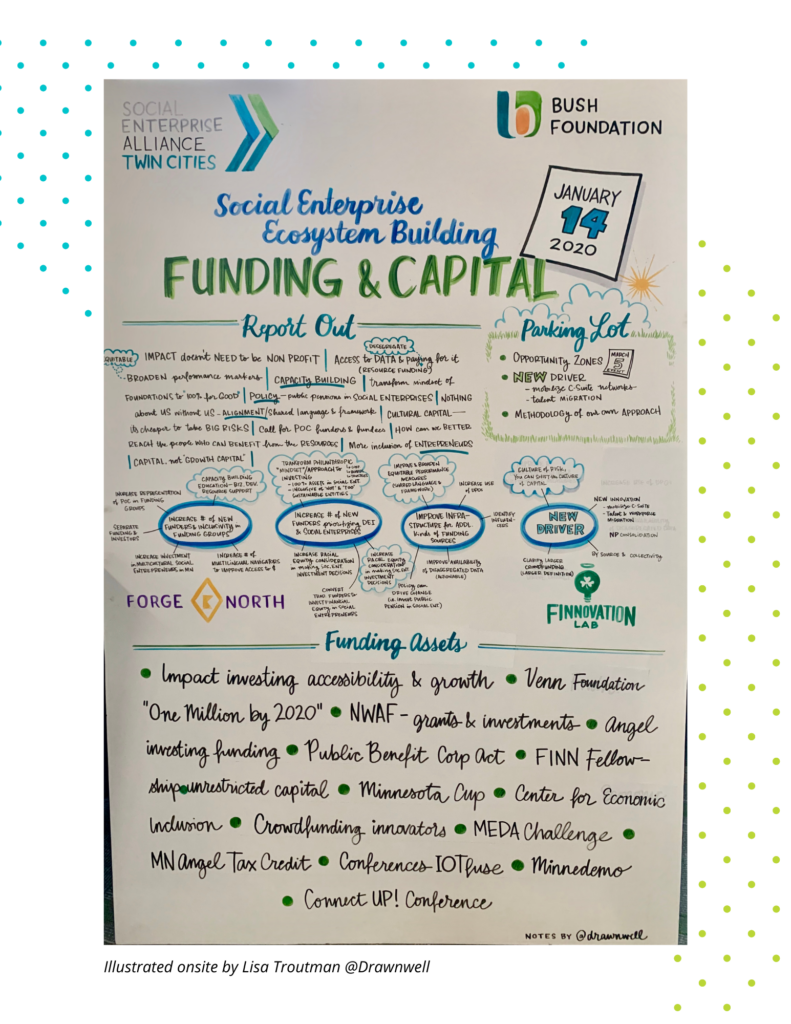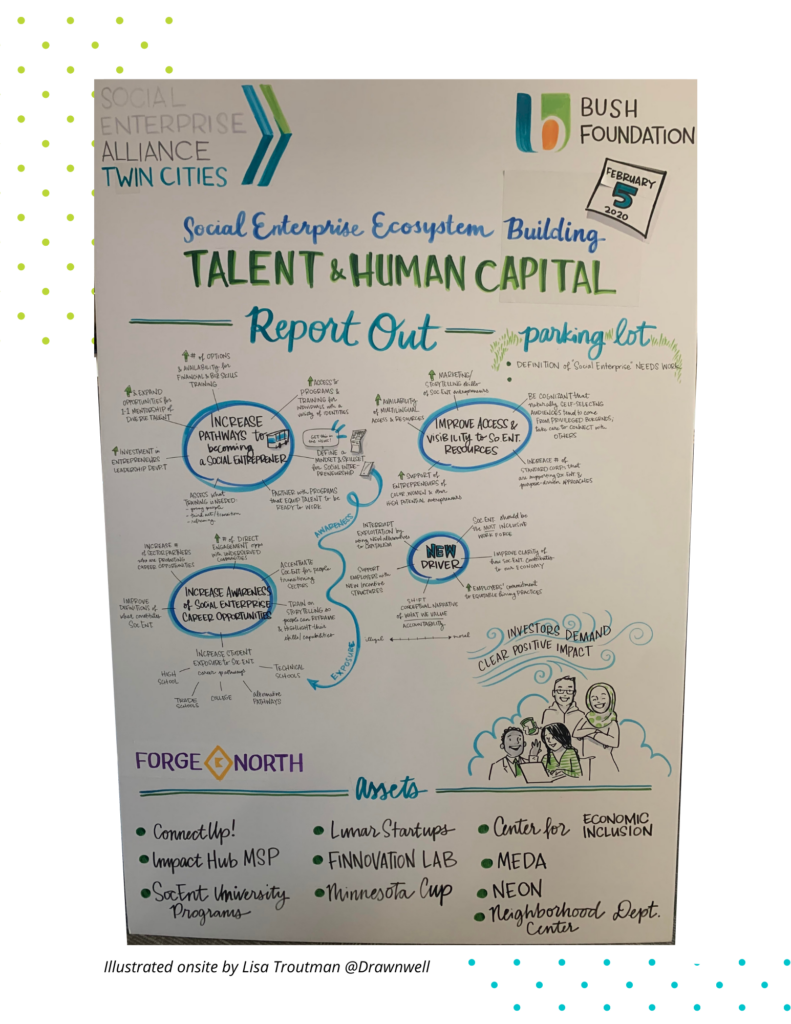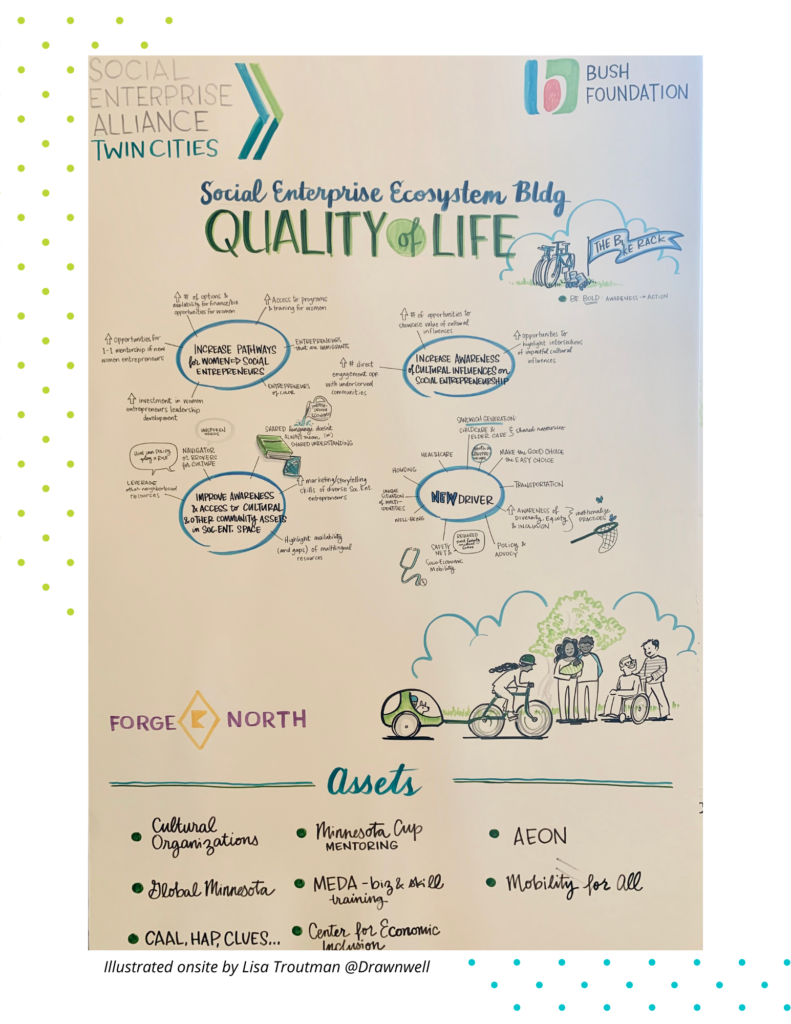Background of Impact Ecosystem Building
Background
The Twin Cities region first participated in a social enterprise ecosystem research project in 2017, led by the Halcyon program in Washington D.C. In conjunction with the report’s release in mid 2018, the Bush Foundation supported the Halcyon team to come to the Twin Cities to share the findings, and bring together social enterprise and traditional business leaders to engage in a conversation about the impact social enterprise is making in our region, and explore the possibilities of how the sector’s impact could be further expanded and supported.
At the close of that gathering, the Social Enterprise Alliance Twin Cities chapter (now Social Enterprise MSP) posed questions of the larger group about “what’s next”? How can we leverage these findings (“hey, we’re 8th out of 22 cities – what would it take to be #1?”) to help us build the sector and drive greater social impact? There was a desire to activate a broader set of partners and mobilize a movement – building the #PurposeDrivenEconomy in our region.
Halcyon Incubator
For the 3rd year, the Halcyon Incubator published a Social Enterprise Ecosystem Report (SocEntCity.org), assessing the strength of regional ecosystems around the country, and come to the Twin Cities to report on the findings in the report.

Event Partners & Collaborators
- Bush Foundation
- Halcyon Incubator
- Social Enterprise Alliance Twin Cities (now SE-MSP)
- Forge North
Community-Led Research Roundtables
SE-MSP, with the continued support of the Bush Foundation, has vigorously pursued building the #PurposeDrivenEconomy over the past year and is intent on expanding participation with a growing audience, grounded in inclusive economy principles, and measures to match (e.g. Rockefeller Inclusive Economies Indicators).
The 2019 Halcyon report release presented an opportunity to launch an expanded series that would build on the 2018 convenings that “planted seeds” for the idea of forming community-led “Leadership Circles” organized around strategic action that is complementary and aligned with other economic development initiatives in our region, as well as globally recognized frameworks (e.g. GreaterMSP, Center for Economic Inclusion, MN Partnership for Sustainable Development Goals, Impact Management Project).
Guiding Research
Halcyon Report
Rockafeller Inclusive Economy Indicators
Greater MSP Regional Indicators
Center for Economic Inclusion Framework
Envision Together Report Out
Envision Together Report Out
After the release of the 2019 Halcyon SocEntCity Report, SE-MSP launched a series of leader listening sessions to further explore the four main pillars behind that ranking–Funding, Quality of Life, Talent, and Support Systems. At these events, experienced stakeholders from the social enterprise community and new invitees discussed theme maps about each of the four pillars populated with potential strategies for improving conditions in that pillar area and together suggested amendments and additions to the theme maps.
Event Series Goals
- Establishment of a SE Leadership community that is committed to paving the way for building a movement and driving greater social impact.
- Agreement on some key areas of focus derived from the Halcyon research/findings.
- Development of a Strategy Map for the SE Ecosystem, with some key Objectives, Measures and Targets
Learning In Action
August Report: A History of the IEC
How did this collective come to be? It all started with the Halcyon Social Enterprise Ecosystem Report (SEER)! This innovative look at the social enterprise sector ranked 21 metro areas on the health of their social enterprise ecosystems by looking at four key domains:
Funding – the availability of growth capital for entrepreneurs
Talent – the number of appropriately skilled and diverse individuals seeking work in the social enterprise space
Quality of Life – social entrepreneurs have sufficient Housing, Transportation, Healthcare and socioeconomic mobility
Support Systems – social entrepreneurs have support systems in place that provide them the ability to form, grow and thrive
In 2018, the Twin Cities ranked #11, and in 2019, we had moved up to #4. Which got Social Enterprise MSP thinking: how can we do even better?
This led to the creation of listening sessions on each of those four domains, or pillars, to dig into what the Twin Cities social enterprise community thought, both about the SEER findings, and about what we could do to improve. Strategies were identified, themes were surfaced, and momentum built, and then…COVID. After a year’s hiatus while the world scrambled to navigate a global pandemic, SE MSP reunited the band and restarted the work with support from the McKnight Foundation.
With the shared wisdom from the community listening sessions, SE MSP convened what came to be known as the Impact Ecosystem Collective (IEC). This is a fluid group of businesses, organizations and individuals who are each doing work that supports the social enterprise ecosystem in one or more of those four pillars. The IEC continues to grow as we collectively work towards a healthier ecosystem, and folks are welcome to join at any time, whether they want to kick off a new project they are passionate about, or if they are already doing relevant work and want to register their impact through the collective. Come join us!
September Report: Flexibility is Key
Lessons Learned: Flexibility is Key. You have probably also learned this lesson at some point in your life, but allow us to share some of the ways this lesson has shown up in our IEC work.
It’s no surprise that convening a group of talented entrepreneurs is bound to have all the usual challenges: juggling busy schedules, balancing work and life, iffy Zoom connections…you’ve been there, you get it. But we’ve also learned how powerful flexibility can be when it comes to allowing the work itself to evolve. As a community collective, a core value of the IEC is to center the experience and needs of the community itself, and sometimes, new needs arise in unexpected ways.
Clare Healy first joined the IEC as both a board member of SE MSP and a Business Systems Architect at a social enterprise, and she planned to lead a project aimed at raising awareness on college campuses about careers in social enterprises. She was also leveraging her professional experience with project management to help identify a way for the IEC members to identify metrics and track their progress. This led to the realization that it wasn’t just the IEC that needed a way to measure impact; this was important across the sector. Cue her new IEC project: identifying a tool that can be deployed across the Twin Cities social enterprise community to track metrics and measure impact. This will do two important things:
Give individuals and organizations a way to demonstrate the impact of their businesses and projects, which is key when seeking funding, press, etc.
Create a way to demonstrate the impact that we are all having collectively by building businesses on the triple bottom line of people, planet and profit.
So what started as one thing turned into quite another, and we are here for it! (CH addition: Clare packaged up the work she completed around social enterprise career paths so that someone else could pick it up if interested, and began anew with the measure and evaluation project.) We look forward to the power that data can bring to the important work social entrepreneurs are doing every day.







